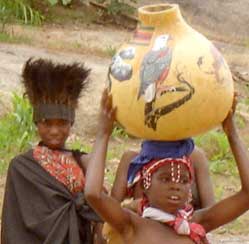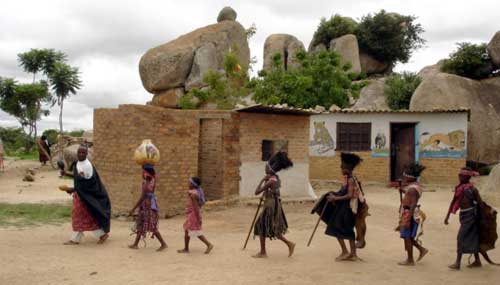|
Daisy
and Tony Maulana founded the Maulana School for Orphans for
1400 orphaned children in Epworth, a high density suburb near Harare.
We first met them at Irene Chigamba's, a nationally recognized performer
in Zimbabwe. We were so impressed by their traditional dance performance,
a visit to the school was warranted which happened the day before
we flew home. We drove up and down, up and down, up and down a dirt
road trying to find the entrance. Finally, several people, thinking
we were out of our minds, I'm sure, directed us through what looked
like the front yards of dozens of houses. We were greeted enthusiastically
and taken for a tour of the school. The classrooms were literally
in the boulders. GR 2, etc was spray painted on the rocks. Maize
was growing in the "classroom," because as Daisy explained, the
growers didn't understand the vision of the school. There was the
broken-plywood-covered septic, which was "a challenge." Herb garden.
Three-room schoolhouse, very compact, one room didn't have a roof.
A large tent donated by a British NGO for rainy times, certainly
not large enough to hold all the children. A stone "stage."
 Daisy
and Tony gathered the children and they put on a dance performance
for our carload of guests. What an honor. The children don't live
at the school, though several of them stay there awhile when "times
are hard" at home. Farai Makoni also arrived at the school, on foot,
during our visit. He is a founding member of the Maulana Child Protection
Organization, a sort of social worker. Daisy
and Tony gathered the children and they put on a dance performance
for our carload of guests. What an honor. The children don't live
at the school, though several of them stay there awhile when "times
are hard" at home. Farai Makoni also arrived at the school, on foot,
during our visit. He is a founding member of the Maulana Child Protection
Organization, a sort of social worker.
We
discussed how we would like the school to forward proposals for
projects that needed funding. It was not appropriate to offer money
to these people at this point, so instead we left them some school
supplies and mahewu, a nutritional powder that is mixed with water,
and our words of intention to further our connection with them.
After that visit, we had a friend return to the school with
food for the children, purchased by HopeFirst Foundation. HopeFirst's involvement, in
line with our mission, will be accessing clean water for the children,
and providing
marimbas to a school committed to retaining the cultural identity
of orphaned children.

|

